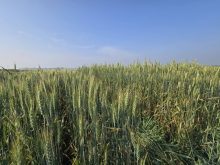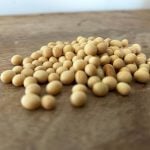Ten years after Monsanto put the brakes on releasing genetically modified (GM) Roundup Ready wheat, 16 organizations in Canada, the United States and Australia have stated their support for commercializing GM wheat.
However, the trilateral statement issued June 5, also suggests countries adopt a policy for dealing with the low-level presence of GM crops in non-GM crops, synchronize the release of GM wheat traits with approval in importing countries and have a system to segregate GM wheat so customers can still buy non-GM wheat.
“The goal (of the statement) is to help encourage investment and innovation in wheat,” Cam Dahl, president of Cereals Canada, one of five Canadian organizations that signed the statement, said in an interview last week. “That includes biotechnology, but that isn’t the only tool. We have seen the results of investment in innovation in other crops. We do need to see that in wheat.”
Read Also

Manitoba trials work toward drone spraying approvals
Canada’s PMRA says pesticides need drone-specific labels before drone spraying can take off; Manitoba crop trials are adding data towards that approvals process.
The seven-point statement also supported by the Western Canadian Wheat Growers Association, Grain Growers of Canada, Grain Farmers of Ontario and the Canadian National Millers Association, says wheat innovation is needed to help feed the world.
They also believe GM crops are safe.
“More than 15 years of commercial production and peer-reviewed scientific research show this technology is safe for the environment and consumption,” the statement says. “Over one trillion meals have been consumed without a single reported incident and studies have found that biotechnology and products derived from biotechnology have not caused any legitimate food safety concerns.”
Nine organizations from the three countries signed a similar statement in 2009 and Dahl believes it helped encourage more wheat research.
“The attempt is to lay out the path forward that would allow this investment to happen because it’s important,” he said.
- More from the Manitoba Co-operator: Global warming turned anti-GMO activist Mark Lynas into a promoter
The statement demonstrates the wheat industry is aware of market concerns. In the early 2000s, 82 per cent of Canadian Wheat Board customers said they wouldn’t buy GM wheat.
When dealing with market resistance to GM wheat, the industry and government have distinct roles, Dahl said.
“The responsibility of government is that of a strong, science-based regulatory system,” he said. “But when it comes to those marketing questions those are what the industry does really need to address.”
Neither the Saskatchewan Wheat Development Commission nor the Manitoba Wheat and Barley Association, have a position on commercializing GM wheat.
The Keystone Agricultural Producers’ (KAP) policy is that all GM crops be accepted by key markets before commercialization.
“For wheat or any crop it is critical to have market acceptance,” KAP president Doug Chorney said.
The Canola Council of Canada has the same policy, he said.
Cereals Canada’s support for GM wheat is consistent with the policy of its member-associations, which includes the Grain Growers, miller’s association and life science companies, Dahl said. The policy was adopted by Cereals Canada’s board of directors, which includes farmers as well as officials with companies researching GM wheat.
Saskatchewan and Manitoba’s new wheat associations are not Cereal Canada members yet, but are considering it.
Monsanto was leading the way on commercializing GM wheat with a Roundup Ready variety. A coalition of farm and environmental groups opposed to the release formed in 2001. Members included KAP, National Farmers Union, Canadian Wheat Board, Agricultural Producers Association of Saskatchewan and Greenpeace.
The coalition wasn’t just worried about losing wheat markets, but agronomic issues such as potentially higher weed control costs due to Roundup Ready wheat volunteers and possible negative impacts on zero tillage.
On May 10, 2014 Monsanto Canada announced it was deferring its work on Roundup Ready wheat “until such time that other wheat biotechnology traits are introduced.”
The company said it would focus on improving new and improved traits in corn, cotton, and oilseeds.
















